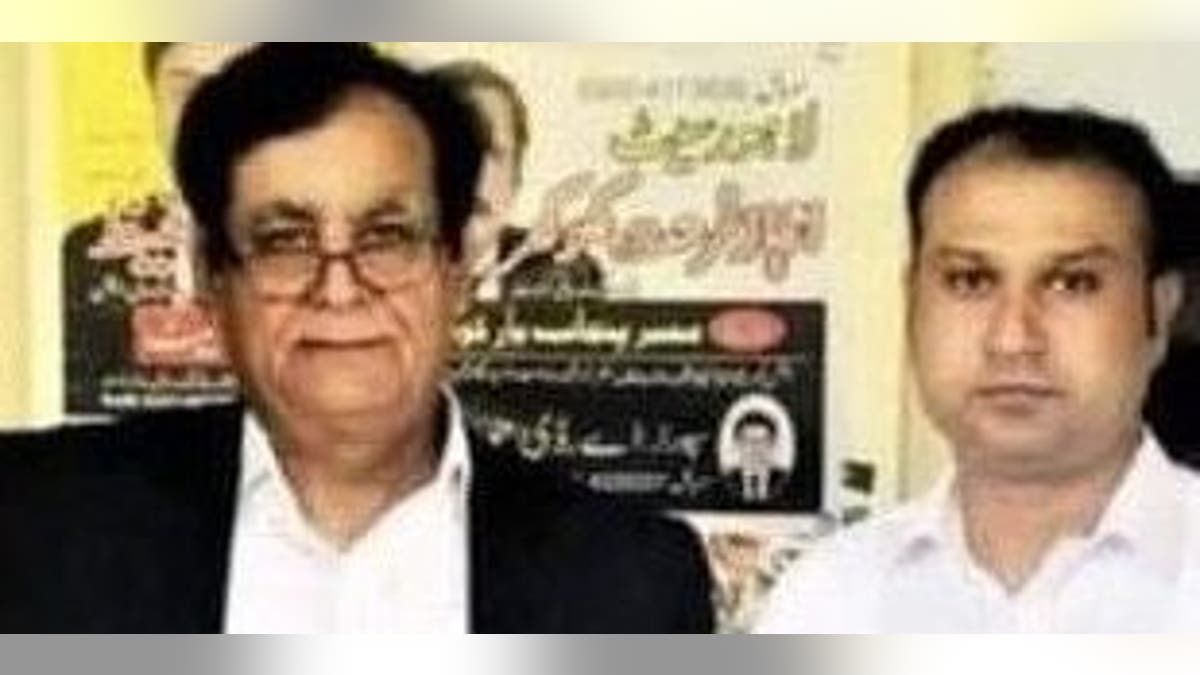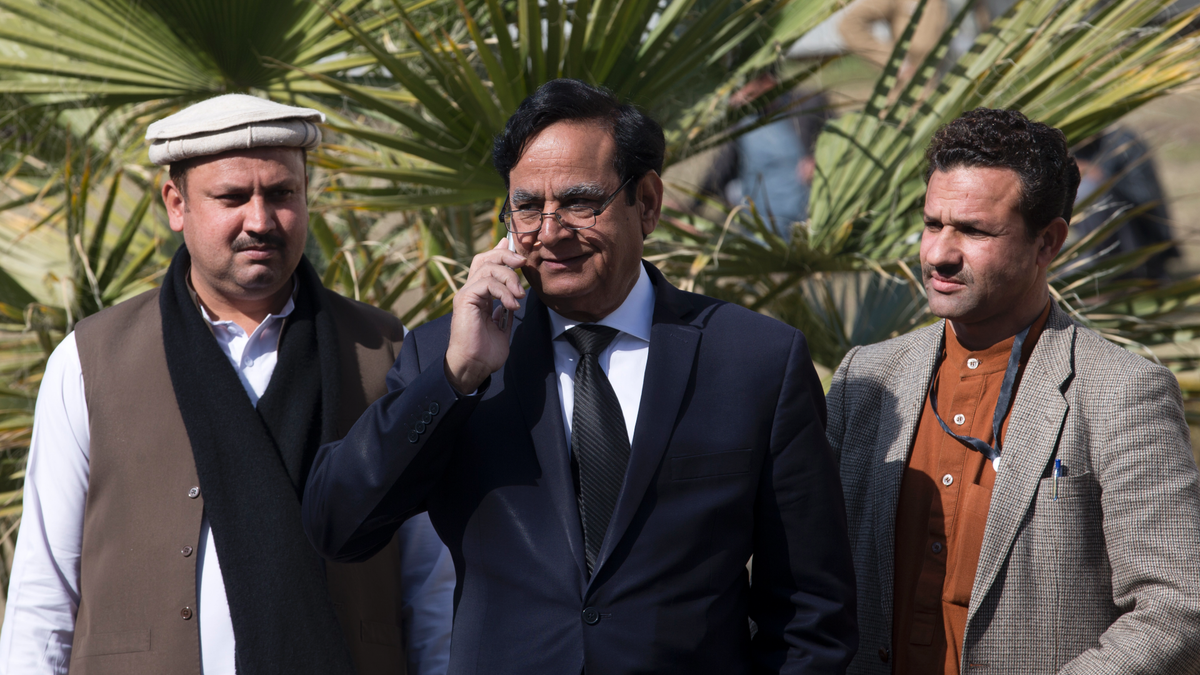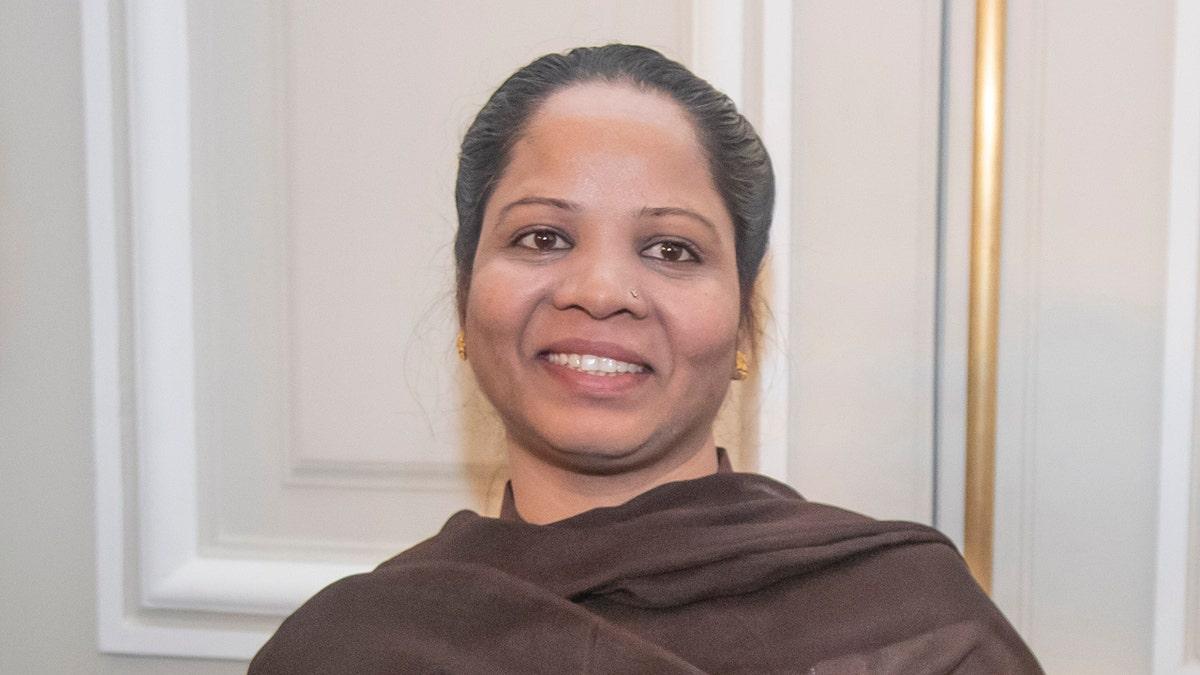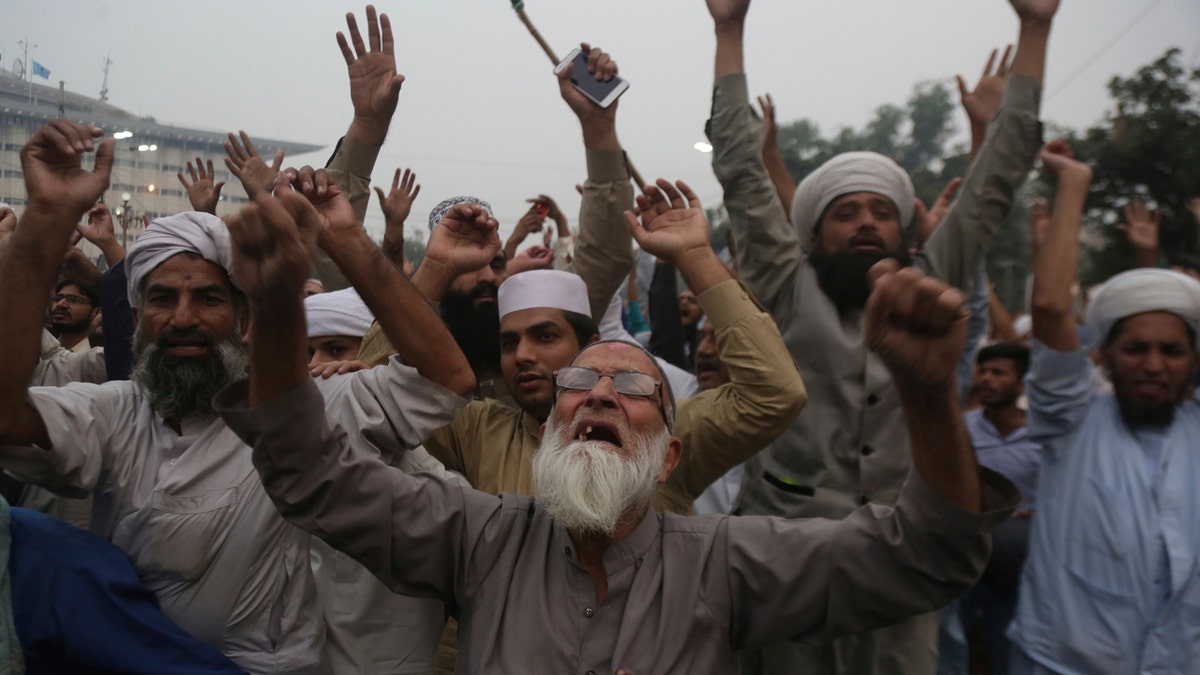Fox News Flash top headlines for September 21
Fox News Flash top headlines are here. Check out what's clicking on Foxnews.com.
In the depths of a squalid Pakistani jail cell – kept far from the rest of the inmate population at Lahore's District Prison – a poor Christian factory worker is awaiting execution.
A judge convicted Asif Pervaiz, 37, of blasphemy and he was sentenced to death earlier this month. Those advocating for Pervaiz's innocence claim it was not blasphemy and that he merely refused to buckle to pressure and convert to Islam.
"This is a tragic situation; the first case in Pakistan's recent history where a Christian has been accused of blasphemy for refusing to embrace Islam," Pervaiz's attorney, Saif Malook, told Fox News. "This man, Asif's boss, wanted him to leave Christianity, and Asif knew he would suffer a lot by saying no. But he kept his faith."

Attorney Saif Malook and his client Asif Pervaiz, who was sentenced to death in Pakistan this month after the country's draconian blasphemy laws (Courtesy Saif Malook)
Pervaiz's nightmare began in 2013 after his supervisor, Muhammad Saeed Khokher, at the garment factory where he worked allegedly pressured him to become a Muslim on multiple occasions, according to Malook. When he refused, Khoker went to police with allegations that the devoted Christian had sent him "blasphemous" text messages defaming the Muslim Prophet Muhammed.
PAKISTANI PM SUGGESTS SURGICAL CASTRATION FOR RAPISTS AFTER WOMAN GANG RAPED ON HIGHWAY
Khokher has since denied that he had attempted to compel his work subordinate to convert. In Pakistan, insulting the Prophet carries a mandatory sentence of capital punishment, and the court has vowed that Pervaiz will be "hanged by his neck until death."

Saiful Malook, center, lawyer of Pakistani Christian Asif Pervaiz (AP Photo/B.K. Bangash)
However, the defendant has firmly dismissed the claims, and his attorney further contended that at the time, some seven years ago, anybody could purchase a phone SIM card without showing identification. While legislation has since become tougher and chips now require registration in Pakistan, anybody could simply claim a text message came from a person without verifiable proof.
Malook is preparing to appeal the death sentence, yet he has cautioned his client that the process will mean many more years ailing behind bars.
"As a person, Asif has always been a special young man – very strong, and he never wept until this month when they sentenced him to death. Mentally, he is feeling broken," his lawyer continued. "I've told him that he must find his strength – it is a long journey ahead, that he will not survive unless he can stay strong. I wanted to lie and tell him it would be over soon, but it will be many more years of fighting."
Malook also boldly took on the Asia Bibi case in Pakistan, the impoverished Christian woman who was also convicted of blasphemy. Her case languished on death row for almost 10 years through a long series of appeals and threats before finally being freed in October 2018. Months later, she quietly fled her homeland to the relative safety of Canada as protests over her acquittal erupted in the streets.

Asia Bibi, a Pakistani Christian woman, poses with her diploma as a Citizen of Honor of the city of Paris at City Hall in Paris, Tuesday, Feb. 25, 2020. Bibi, acquitted of blasphemy after spending eight years on death row in Pakistan, said she is going to request asylum in France. (AP Photo/Michel Euler)
And in cases like Pervaiz, it is not just the accused who suffer.
His beleaguered wife – who was diagnosed with cancer – and four young children remain in hiding. Since his arrest seven years ago, they have struggled to find food and any means of income – relying on pennies from local Christian charities for survival.
Watching from behind iron bars as his family falls apart is eating away at Asif's sanity, Malook noted.
"His wife is still very sick, almost like a skeleton, and she fell down and collapsed at the prison while we met with Asif," Malook said on Friday, just hours after returning from the meeting. "The children were weeping for their father; they are all under threat. Everyone is scared to be around them; they are a poor family as it is. It was just so sad."
International human rights bodies have long warned that in Pakistan, unmerited accusations of blasphemy continue to imperil lives – and not only within the minority Christian population. As Malook observed, most of the country's blasphemy charges are directed at Muslims.

Protesters shout slogans during a rally to condemn a Supreme Court decision that acquitted Asia Bibi, a Christian woman, who spent eight years on death row accused of blasphemy, in Lahore, Pakistan, Friday, Nov. 2, 2018. (AP Photo/K.M. Chaudary)
Last month, Amnesty International underscored an "alarming uptick" in such charges and stressed that the "draconian laws that enable abuse and risk lives must be repealed."
"They have been used to target some of the most marginalized people in society, including children, individuals with mental disabilities, members of religious minorities, and poorer people," the Amnesty report stated. "Though the majority of those accused are Muslim, as 98 percent of Pakistan's population adheres to Islam, critics have argued that the laws disproportionately target minorities such as Christians and Hindus, who are falsely accused due to discrimination rather than guilt."
The stringent laws regarding religion date back to 1860 when they were first endowed by India's British rulers, and broadened in 1927. Pakistan automatically acquired the harsh legislation when the country was birthed after a 1947 separation from India.
It was not until the 1980s when such offenses started to sweep through the Pakistani population, under the reign of General Zia ul-Haq, who endeavored to further "Islamize" the laws on the books with numerous clauses. In 1980, it was declared that the crime of making disparaging remarks concerning Islamic personages carried a three-year prison term. Two years later, a life prison term was mandated for anyone found guilty to "willful" defilement of the Koran, and then in 1986, it was recommended that blasphemy – the act or offense of speaking sacrilegiously about the Prophet – come with a death sentence.
According to the National Commission for Justice and Peace (NCJP), a total of 776 Muslims, 505 Ahmedis, 229 Christians and 30 Hindus have been accused under various clauses of the blasphemy law between 1987 and 2018 – with the overwhelming majority charged with desecration of the Muslim holy text rather than fully fledged blasphemy.
But even without formal judicial proceedings, the charges come with the cost of human life. In July, a 54-year-old man, Tahir Ahmad Naseem, who had mental disabilities, was shot dead in the Peshawar High Court as he was being presented for trial on blasphemy allegations.
The 2020 report released by the United States Commission on International Religious Freedom (USCRIF) in April recommended that the State Department redesignate Pakistan, a military ally of the U.S., a "country of particular concern (CPC)" given that "in 2019, religious freedom conditions continued to trend negatively."
"The systematic enforcement of blasphemy and anti-Ahmadiyya laws, and authorities' failure to address forced conversions of religious minorities – including Hindus, Christians, and Sikhs – to Islam, severely restricted freedom of religion or belief," the report surmised.
While amending the dated blasphemy laws has routinely been touted as a top priority for a number of Pakistan's secular political parties seeking dominance in Islamabad, little headway has been made over the years due in large part to the sensitivity surrounding the hot-button issue.
CLICK HERE TO GET THE FOX NEWS APP
And for the likes of Pervaiz, it means falling into the field of the forgotten.
"A Pakistani prison is not a good place when you can't afford to pay the guards any bribes. You can't breathe properly, and the Christians charged with blasphemy must be held separately; otherwise, they will be killed," Malook added. "It has been seven years in the prison for Asif already, and there will be many more as we fight his execution. We need the help of the western Christian world."

